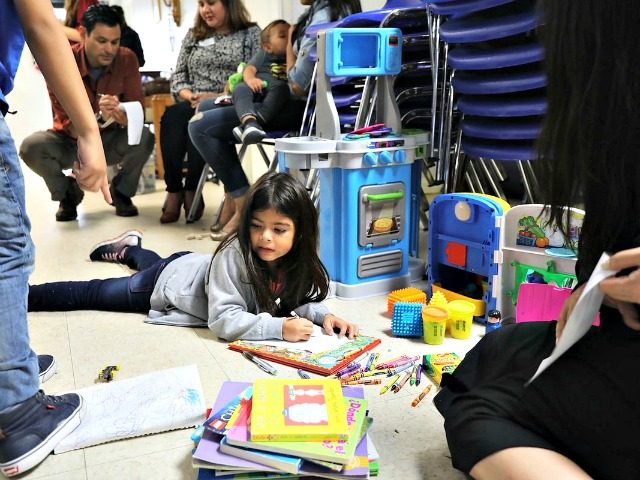Many migrant children are traumatized by their parents’ decision to bring them on the dangerous journey to the U.S. border, says a report by the inspector general at the Department of Health and Human Services (HHS).
The report undermines claims by Democrats and the established press that the children are “traumatized” by their brief stay in the barebones U.S. border facilities where they do rest, eat and get medical care after their parents deliberately brought into territory where many criminals, coyotes and cartel gangsters prey on migrants during their journey through Mexico.
The HHS report says, “some children also experienced the trauma from being unexpectedly separated from their parent” in the border centers, as the parents face expected courtroom charges of illegal entry into the United States.
But it notes first many children are already traumatized when they arrive in the United States after a long and dangerous journey for many from Central America through Mexico to the U.S. border and even from experiences in their home country:
Facilities that care for children in the Office of Refugee Resettlement’s (ORR’s) custody face the difficult task of addressing the mental health needs of all the children in their care, including children who have experienced intense trauma. According to those who treat them, many children enter the facilities after fleeing violence and experiencing direct threats to their safety during their journey to the United States.
The establishment media has used the Office of Inspector General’s (OIG) report for Health and HHS to tout claims by pro-migration advocates that some minors have experienced trauma when the parents were sent to detention while they are tried for entering the country illegally.
The OIG concluded that Trump’s immigration policies “exacerbated” the migration trauma to help children because it resulted in more children who stayed on average longer in federal custody.
The OIG report tries to blame the separation of children from family members on “U.S. immigration policies” — downplaying the state’s duty to enforce the published and well-known laws against illegal migration.
The report targets the Trump administration “zero tolerance” policy which implanted the often-ignored federal immigration law against all border-crossers, including the migrants who brought their children to help them use the Flores Agreement catch-and-release loophole..That full-implementation policy was only in place for one month before President Donald Trump ended its enforcement amid emotional protests from immigration lawyers and their media allies.
The report did not address the issue of what kind of mental health treatment children would receive once they were returned to their parents or to other relatives or sponsors in the United States.
But the report also reveals how much the federal government is doing to aid the children, under the heading “Required Mental Health Services in Care Provider Facilities:”
According to the terms of the 1997 Flores Settlement Agreement, which sets national standards regarding the detention, release, and treatment of children without legal immigration status in Federal custody, children must receive necessary medical and mental health services. Within 24 hours of the child’s admission, facility staff must perform an initial intake assessment to identify, among other things, any immediate medical or mental health concerns that may require prompt intervention. Within 5 days of arrival, a child must also undergo a UAC assessment to more fully examine the child’s mental health history and concerns. This assessment forms the basis of the child’s service plan.
At a minimum, each child in ORR custody must receive at least one individual counseling session per week from a trained mental health clinician. The objective is to review the child’s progress, establish new short- term objectives, and address both the developmental and crisis-related needs of the child. Additionally, facilities must provide children at least two group sessions per week, which allow staff and children to discuss whatever is on their minds and to resolve problems. Facilities also must ensure that children receive emergency health services, prescribed medications, and appropriate mental health interventions.
The OIG report explained how HHS is meeting those requirements, given the fact that many of the children have suffered at the hands of their parents.
“Facilities described the challenges inherent in addressing the mental health needs of children who had experienced significant trauma before coming into HHS care,” the report stated.
“Facilities reported that challenges employing mental health clinicians resulted in high caseloads and limited their effectiveness in addressing children’s needs.”
The report also explains HHS’s Unaccompanied Alien Children Program, including that in the “federal fiscal year 2018, the UAC Program received appropriations of $1.6 billion and cared for at least 49,100 children. About 12,400 children were in the UAC Program at the time of our review.”
The OIG said 45 ORR-funded facilities were visited, almost half of the all of ORR’s facilities, and interviewed dozens on staff, including approximately 100 mental health clinicians.
Follow Penny Starr on Twitter

COMMENTS
Please let us know if you're having issues with commenting.